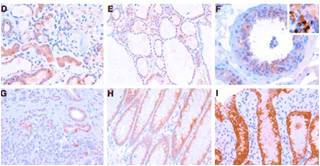Professor Alison Banham's recent Leukemia paper shows the use of Anti-FOXP1 clone JC12 in a new application, ChIP. The study used microarray analysis of FOXP1-silenced diffuse large B-cell lymphoma (DLBCL) cell lines to identify the differential regulation of immune response signatures and major histocompatibility complex class II genes as some of the most significant differences between germinal center B-cell-like DLBCL and activated B-cell DLBCL. The loss of MHC class II expression in primary DLBCL correlated with poor prognosis and is proposed to allow tumours to evade immune surveillance.
The FOXP1 transcription factor is widely expressed in normal tissues however it's expression is frequently altered in tumours and can sometimes be a marker of poor prognosis. FOX transcription factors play important roles in the regulation of tissue- and cell type-specific gene transcription during both development and adulthood.

Use of clone JC12 in immunohistochemistry.Banham et al. 2001. Cancer Res. 61(24):8820-9.
Professor Alison Banham is Head of the Nuffield Division of Clinical Laboratory Sciences and leads the Bloodwise/ Cancer Research UK Haemato-oncology Group at Oxford University. Professor Banham is very experienced in monoclonal antibody production and characterisation. She is Vice President of the European Monoclonal Antibody Network, which represents the first European network of laboratories linked to academic Institutions, each having an internationally recognized reputation in the production and use of monoclonal antibodies.
View the datasheet for more information and publications.
HAVE YOU REGISTERED?
Join the ever-growing global Ximbio community. Register and receive updates about new reagents, institutes and new features being added to the website.
